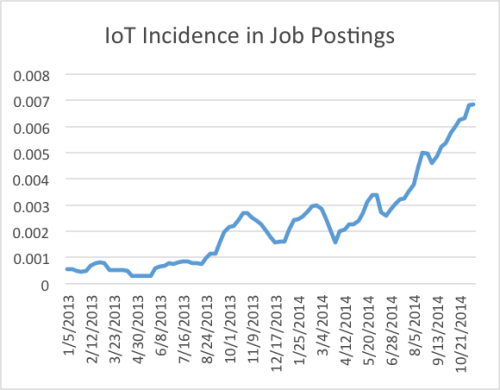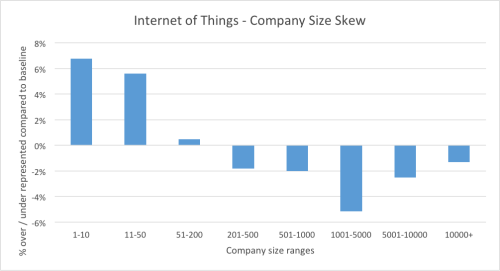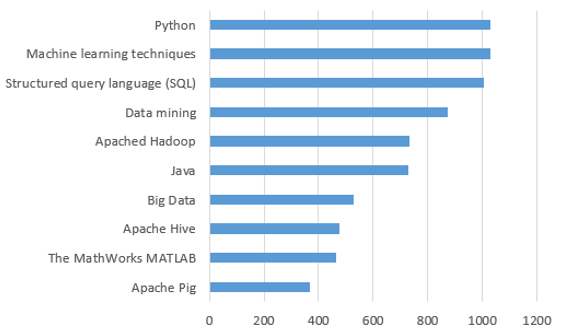Should you believe the hype on the Internet of Things? Can it really be the (NBTE) Next Biggest Thing Ever?
Gartner thinks there will be 26 billion “Internet of Things” units by 2020. Not to be outdone, IDC predicts 212 billion “things”. This seems like a big difference between crystal balls, but what’s an order of magnitude discrepancy between competing analyst firms, right? The gold rush has gotten so bad that the esteemed HBR (and I really do like HBR) is slinging puff pieces to make sure they’re “saying something” on the topic. Scoffing aside, only the delusional would put IoT down as a fad.
Another interesting dynamic about the Internet of Things is who the players will be. Going back to Gartner, they predict, “50 percent of internet of things solutions will originate in startups that are less than three years old.”, and hiring does seem to be taking off like a rocket:

But is Gartner right? When we look at the data we see pretty much the same thing. Looking at the LinkedIn universe (220 million profiles, and counting), we also see a strong skew towards smaller companies:

Even with that skew towards small companies, all of whom are clamoring to be the next “Multi Billion Dollar Company That Didn’t Exist Five Years Ago”, the major enterprise IT vendors are making massive investments too. When you take a look at how many people they already have on staff related to IoT, and the job postings to grow the teams even more, the numbers are pretty shocking:
Admittedly, this data’s a bit fuzzy. Not everyone who’s working on something related to Internet of Things declares so online. In addition, some companies are putting “Internet of Things” in jobs postings that have nothing to do with the trend. But the numbers are solidly directional. Cisco has made no secret of their IoT investments. And Intel, having been nearly left on the sidelines of the Mobile revolution, is committed to do what it takes to have a front row seat for IoT.
As a sidebar, Microsoft is well positioned to capitalize on IoT with Azure as a strong backend services, but what about the software that runs on the IoT devices? I’m sure that Microsoft has lots of reasons for porting the .NET framework to other platforms, but ask yourself this: What chance would Microsoft have of getting IoT device developers to use the .NET framework if they didn’t let it run on other platforms? Android today, IoT tomorrow?

When we talk to our network about impediments to the IoT, the one thing that comes up over and over is security. Will we have 100 billion or so compromised devices by 2020? “Sort of,” they say. Experts point out that Cisco has been doing a respectable job of making secure Internet connected devices since the dawn of Internet connected devices. And they believe the major enterprise IT vendors are probably going to do fine on the security front. But what about all those startups?
Unfortunately, we’re told, many of them just dream of selling enough devices to be worthy of the hacker attention. If 1 billion people using Android is any indication, lack of security isn’t going to slow adoption, but it will make an IoT future some “interesting times.”
Don’t miss out on any of our insights on the tech sector and competitive intelligence.
Subscribe to the Cascade Insights newsletter today!